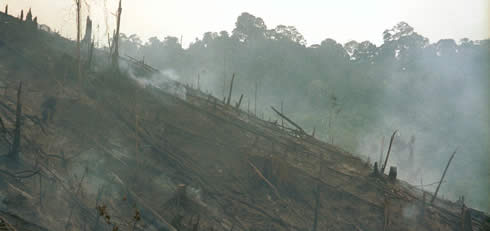WWF (World Wide Fund for Nature) says that it is ready to help Singapore and Indonesia identify the perpetrators behind the worst haze experienced by Singapore in two decades.
Singapore’s air pollution — which soared to a record 401 on the Pollutant Standards Index (PSI) at one point — underscores that deforestation is a global problem and that the slash and burn clearing of lands for the commodities of palm oil and paper affects us all. WWF, a conservation organisation whose tools, research and expertise around the situation in Indonesia have guided ongoing efforts to address the haze and fight deforestation, calls on the governments in the region to work closer together, partner with organisations to get to the root of the problem, and seek out irresponsible companies.
“This is officially the worst haze that Singapore has ever experienced. Our people’s health is bearing the brunt of the impact and businesses are consequently affected. We should not contend with this situation and a concerted solution must be found for the long-term good of Singaporeans, Indonesians and the people living in the region. Governments must take strong, decisive action to work even closer together with one another and with agencies who work on the ground to address the issue collectively. It is time to take a tough stand with culpable corporations who have little regard for the damage caused to the well-being of the people, environment and the rich biodiversity including endangered species,” says Ms Elaine Tan, CEO, WWF-Singapore.
”Forest and plantation-based companies must operate by complying with the related rules and regulations and must respect the environment — irrespective whether they are foreign or local. Beyond halting any new land clearing using fire, strong preventive actions that address the issue through collaboration with local NGOs and civil society is encouraged,” says Anwar Purwoto, Forest Program Director of WWF-Indonesia. “WWF Indonesia is ready to support Government of Indonesia to take necessary measures in preventing further haze and land/forest fires from happening again in future, such as monitoring the hotspots for law enforcement purpose and developing community-based fire mitigation,” Anwar adds.
WWF and associated NGOs have been in the forefront of using satellite and mapping-based technologies to identify and locate “hotspots”, informing Indonesian, Singapore and ASEAN government action. Additionally, WWF has been working on the underlying issues of deforestation in Indonesia for many years, including working with palm oil, pulp and paper companies, and the government to identify and protect forests of high biodiversity value.
While several palm oil companies have assured that they have a zero-burning policy, it is imperative that they take responsibility for the full supply chain of palm oil and ensure that fruit or processed oil bought from third-party providers are not fueling the haze.
WWF set up the RSPO as a direct response to forest fire and haze in the late 1990s. The palm oil industry has pioneered land clearance without burning and RSPO certified companies can ensure that the palm oil on their own plantations are produced without fire. “However the same companies may be purchasing palm oil fruit or oil from smaller companies and smallholders that are not following RSPO guidelines on fire,” says Adam Harrison, WWF International’s lead on palm oil. “WWF asks that all palm oil producers take necessary measures to ensure that not only their own plantations are certified, but also that that the fruit and oil sourced from third party suppliers has not been produced at the expense of nature or people.”
This will not only help limit deforestation and the acrid haze that follows, but also make a significant step towards protecting the endangered species of Indonesia and slowing global climate change.














